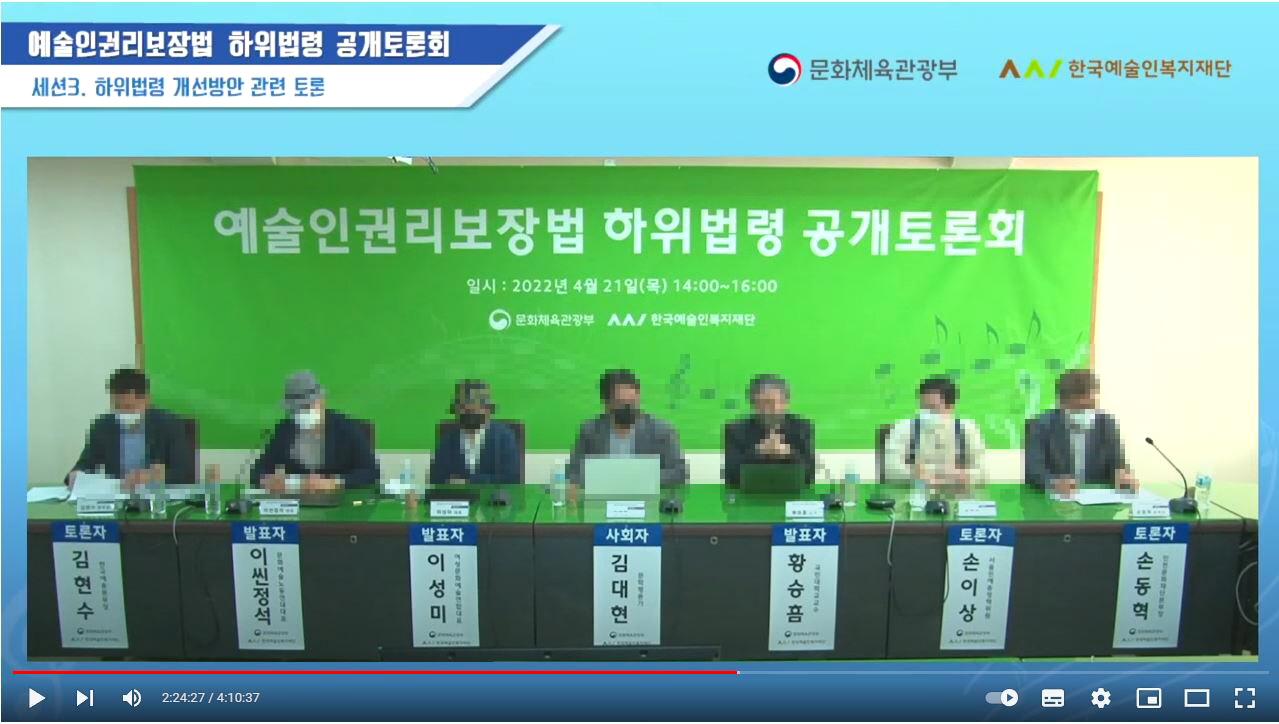- Regardless of nationality, the AGSRA (Act on the Guarantee of the Status and Rights of Artists) should be implemented for all artists and art college students working in Korea-
At the public debate on the sub-law of the AGSRA held on Apr. 21st, Professor Hwang Seung-heum, who has studied AGSRA , answered that migrant artists can also be protected because they are within the scope of “artists” defined by the AGSRA. However, Article 4 of the ‘Framework Act on Culture’ (FAC), referred to in Article 3 (2) of the AGSRA, is expected to be an obstacle to migrant artists.
| Article 3 (2) of the AGSRA (Status and Rights of Artists) An artist shall be duly respected as a citizen with cultural rights under Article 4 of the Framework Act on Culture and as a person who contributes to the realization of a cultural State and the improvement of the quality of life of the citizens. |
Article 4 of the FAC limits cultural rights to the rights of the citizens and specifies cultural rights as follows.
| Article 4 of the FAC (Rights of Citizens) Every citizen shall have rights to freely create culture, participate in cultural activities, and enjoy culture (hereinafter referred to as “cultural rights”) without being discriminated against in cultural expressions and activities, regardless of gender, religion, ethics, generation, region, political opinion, social status, economic position, physical condition, etc.. |
This limits the subject of rights with cultural rights to nationality. And it conflicts with Article 3 (3) of the ‘Act on the Protection and Promotion of Cultural Diversity’ (APPCD).
| Article 3 (3) of the APPCD (Duties of State and Local Governments) The State and local governments shall not discriminate on the grounds of cultural differences according to nationality, ethnicity, race, religion, language, region, gender, generation, etc., with respect to support for or participation in cultural expressions and culture and art activities. |
Accordingly, We, Diverse Artists of Korea Association (DAKA), requests that Article 3 (2) of AGSRA be amended as follows.
“An artist shall be duly respected as a person who has rights to freely create culture, participate in cultural activities, and enjoy culture (hereinafter referred to as “cultural rights”) without being discriminated against in cultural expressions and activities, regardless of nationality, ethnicity, race, religion, language, region, gender, generation, political opinion, social status, economic position, physical condition, etc. and as a person who contributes to the realization of a cultural State and the improvement of the quality of life"
Artists from various nationalities working in Korea have jobs in the Korean culture and arts industry, create and engage in economic activities, and pay taxes. However, they are experiencing various difficulties, such as sexual harassment and sexual violence, as well as discrimination in the field of labor and rights and welfare as art workers. The problem is that migrant artists have not yet been guaranteed their rights within the system of the ‘Artist Welfare Act’ and the FAC.
Therefore, AGSRA is a system that not only Korean artists but also migrant artists have been eagerly waiting for. DAKA sincerely welcomes the Korean government's decision to ensure that artists' rights are protected by AGSRA regardless of nationality. However, we ask you to carefully examine and supplement detailed enforcement ordinances so that migrant artists are not alienated by nationality again.
As Professor Hwang Seung-heum answered at the public debate on the sub-law of the AGSRA, guaranteeing artists’ rights and preventing sexual harassment and sexual violence are not rights of the citizens only, but are human rights. And it is also a basic valid logic in the interpretation of the Constitutional interpretation.
The scope of "cultural rights under Article 4 of the Framework Act on Culture" referred to in Article 3 (2) of the AGSRA is limited on citizens’ rights. This scope limited to the rights of the citizen should be modified as to match Article 3(3) of the APPCD so that the context of this article is in line with the definition of "artist" defined in Article 2 of the AGSRA and that it can eliminate the confusion in the industry that could occur when the law takes effect this September.
If this provision is not amended, the definition of "artist" in Article 2 and the "scope of rights" in Article 3 conflict, which may force migrant artists to file a constitutional petition. In order to block these problems in advance, government agencies must specifically stipulate them in the enforcement ordinance.
The Republic of Korea ratified the Cultural Diversity Convention in 2010, enacted and implemented the APPCD in 2014, and launched the Cultural Diversity Committee as a government organization in 2021. DAKA expects that the enforcement ordinance of the AGSRA will be fully supplemented to suit the Korea status.
Enforce the AGSRA for all artists, regardless of nationality!
May 8th, 2022
Diverse Artists of Korea Association
P.S.) This proposal was submitted to the Ministry of Culture, Sports and Tourism on May 8, 2022 through the Kookmin Sinmoongo(국민신문고). We ask those who sympathize with and support this proposal to report.
Contact Us: Park Kyong Ju
saladboom@hanmail.net
Tel. 02 2254 0517
'뉴스' 카테고리의 다른 글
| 양원선재단, 샐러드 극단 다문화어울림 뮤지컬 수업 후원 (0) | 2022.12.30 |
|---|---|
| 이주민 문화권 관련 유엔 인권 이사회 인권상황 보고서 제출 및 향후 활동 (0) | 2022.09.21 |
| 국적에 상관없이 모든 예술가를 위한 예술인권리보장법을 시행하라! (0) | 2022.05.08 |
| 굿바이, 다문화 극장 샐러드붐 (2) | 2021.02.28 |
| 생존일기 공연 참여 시민 퍼포머 모집 (0) | 2020.11.11 |






댓글